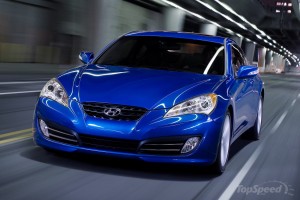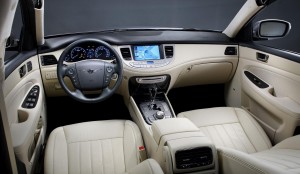2012 Hyundai Genesis: A new beginning
 Hyundai began its drive for bigger, more luxurious cars in 2009 with the Genesis sedan. Directly inspired by the likes of the Infiniti M and Lexus GS, the Genesis recast the brand from its economy-car roots in a way its front-drive Azera never could. Since then it’s brought out a sporty Genesis Coupe and the flagship Equus sedan, but it’s the Genesis that firmly convinced car reviewers and buyers alike, that Hyundai could compete in the luxury arena, without apology.
Hyundai began its drive for bigger, more luxurious cars in 2009 with the Genesis sedan. Directly inspired by the likes of the Infiniti M and Lexus GS, the Genesis recast the brand from its economy-car roots in a way its front-drive Azera never could. Since then it’s brought out a sporty Genesis Coupe and the flagship Equus sedan, but it’s the Genesis that firmly convinced car reviewers and buyers alike, that Hyundai could compete in the luxury arena, without apology.
The Genesis’ impressive details and execution make it a pragmatic luxury-car choice, especially in the quick, plush V-6 version.The Genesis’ calling card isn’t a single model, or powertrain, or even a feature. It’s an overall interpretation of luxury that can be summed up in its styling. A touch of Lexus here, a bit of Infiniti and Mercedes there, the Genesis still looks fresh and has a few details-the grille, the taillamps-that predicted the distinctive themes it’s worked so successfully on the Sonata and Elantra sedans since. The interior’s particularly rich in feel and texture, especially in versions with the leather-upholstered dash and a knob-controller system that can govern the audio and navigation systems via a big LCD screen.
Of the three powertrains buyers can choose on the rear-drive Genesis, it’s the less expensive ones we prefer. The entry-level, 333-horsepower V-6 cranks out the power you’d find in some V-8 luxosedans, with just a slight six-cylinder snarl to call attention to itself.
Like the muscular, 385-hp 4.6-liter V-8 in the mid-line Genesis, the six is teamed with a new eight-speed automatic that’s the attentive, invisible match of its peers. In the uppermost R-Spec edition, 429 horsepower usher the Genesis to 60 mph in less than five seconds, but the stiff ride and meaty steering feel out of character when compared with the other models’ relaxed ride and steering.
Hyundai hasn’t skimped on interior room inside the Genesis. It’s a real five-seater, with great head, leg and knee room for front and back-seat passengers. Leather is standard on all models, with a premium grade specified on V-8 cars, and all five passengers get heated seats on V-8 versions, too-with the driver seat adding ventilation. Trunk space is generous, if not cavernous. Build quality is quite good, and truly competitive with Japanese brands, though we’d like more firmness in the Genesis’ front seats, especially on the sporty R-Spec version.
Safety features have been updated to include a lane-departure warning system (standard on V-8s, optional on V-6s), and all Genesis sedans have eight airbags, including rear-seat side airbags. The IIHS gives the Genesis its Top Safety Pick award, and though the NHTSA hasn’t completed all its tests, the Genesis does earn a five-star rollover resistance score.
Every Genesis comes with Bluetooth, automatic climate control, leather upholstery, and satellite radio and a USB port. The V-6 version can be optioned up with premium and technology packages to approach the comprehensive features found on V-8 cars, including the fantastic Lexicon audio system.
On the R-Spec, the only option is summer performance tires-but there’s no option for all-wheel drive, or for voice controls for audio and navigation, on any Genesis.
It’s a small price to pay for the Genesis’ bargain sticker, which begins in the mid-$30,000 range, or for its excellent warranty coverage.







